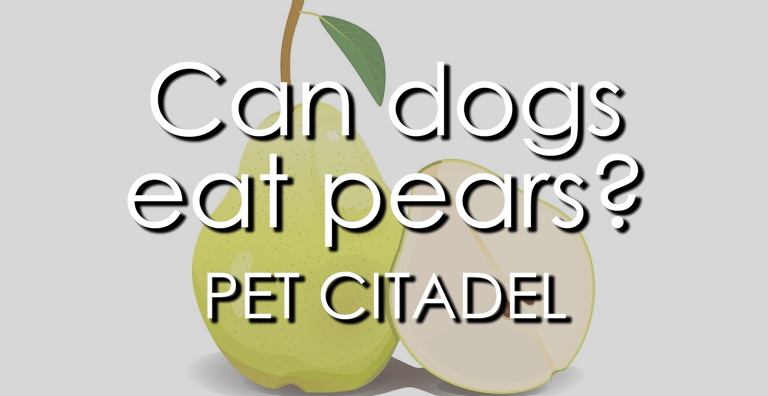This post may contain affiliate links. You can view our affiliate disclosure here.

We sure love to eat pears in hot weather, especially for their refreshing, juicy, sweet, fleshy taste.
And if you’re a dog owner enjoying a pear while your salivating dog sits by you hoping to get a little taste, you may ask yourself: can your dog eat pears? Is it safe to share a little piece with your best friend?
If you hesitated to share your pear with your dog before, don’t fret next time — pears are safe for dogs. They are as good and refreshing for them as they are for humans.
Benefits Of Pears For Dogs
1. They contain potassium.
Pears contain potassium, an electrolyte important for replenishing your dog’s energy.
This mineral is great for the muscles, heart and nerves.
2. They contain antioxidants.
Another advantage is that pears contain the antioxidant anthocyanin with lutein.
This helps with eye health, and when supplemented with other vegetables as part of a balanced meal, it can help neutralize free radicals that can cause oxidative stress.
3. They’re packed with vitamins.
Pears are a good source of:
- Vitamin K: very beneficial for active dogs; promotes good bone density.
- Vitamin B6: helps develop the brain and promote good brain function.
- Vitamin C: not so much of a benefit since dogs, unlike humans, produce their own, but the good news is that the small amount contained in pears is not dangerous to them.
What is a safe amount of pear to give?

Pears contain sugar, so it is best to only feed your dog small amounts of the fruit.
I would suggest a small piece as a reward, or a few small pieces in between meals, once or twice a week. Too much sugar can cause an upset stomach.
Make sure the pieces are small enough for your dog to chew, and clean out the seeds which can can cause cyanide poisoning,
Is the peel harmful to your dog?
No. Pears, including the peel, contain fiber that is helpful to your dog’s digestion.
In general, pears are a source of soluble and insoluble fiber. Like in humans, a healthy gut is important for the functioning of the immune system, so a little fiber can be beneficial, but too much can also lead to diarrhea.
If your dog is experiencing a slight bout of constipation, a couple of small pieces of pear may help move their bowel.
So, yes, go ahead and feed your dog an unpeeled pear; just be sure to always wash the fruit, remove the stem, and cut the core out in order to remove any seeds from the inside.
What about canned pears?
Never feed your dog canned pears.
These are filled with sugars and preservatives that can cause health problems including indigestion, diabetes, dehydration, and depression, to name a few.
Are pears good for all dog breeds?
Most dog breeds can eat pears and other fruits like strawberries. Nonetheless, always make sure to speak to your veterinarian before introducing a new fruit to your dog’s diet, especially if you’re unsure of its safety.
The allowed intake and amount of what they can safely eat may depend largely on your dog’s health, if it’s active or sedentary, and its current state of health.
Conclusion
Much like with people, pears can be a healthy addition to a canine diet, but they should be given in moderation due to their high sugar content.
Pears are high in potassium, vitamin C, vitamin K, antioxidants, and other nutrients, and can be a good food to give your dog from time to time to boost its energy. It can also reverse dehydration due to its high water content.
Thanks for reading. Are you considering feeding your dog pears? Feel free to share your situation in the comments below.



